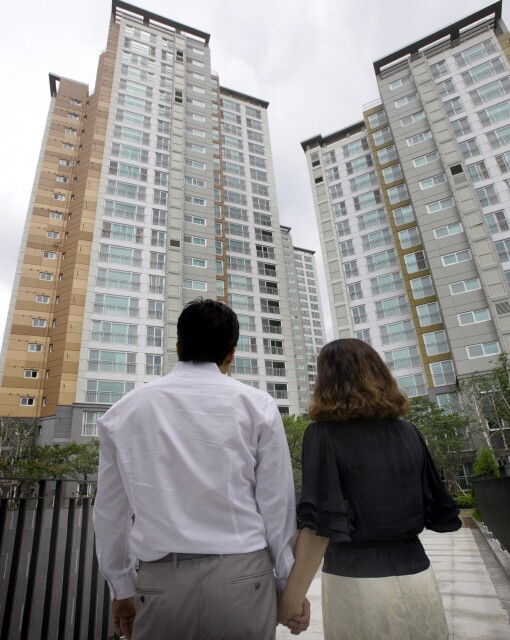hankyoreh
Links to other country sites 다른 나라 사이트 링크
Burdens of child rearing one primary reason behind South Korea’s low birthrate

Some parents with children in elementary, middle or high school are reluctant to have additional children even though they would like to have more, and the main reason is the burden of raising children, both financial and otherwise, a new report finds.
On Mar. 4, the Korea Institute of Child Care & Education (KICCE) published a report titled “A Thorough Analysis of Government Policies Aimed at Countering the Low Birthrate per Life Cycle Stage.” An online questionnaire of 1,200 expecting parents and parents with at least one child of high school age or below found that the average number of children desired by these parents is 2.04. Among the 900 households with children of high school age or below, 65.3% (588 people) responded that they did not intend to have any additional children. But when members of this group were asked whether they currently have their desired number of children, 78.2% said that they did, while 21.8% said they did not.
Further questioning of this group of 21.8%, showed that the main reason they are not planning to have more children even though they do not currently have their desired number is the cost of raising children. More than half of this group (53.1%) cited the burden of childcare costs, while other reasons mentioned were the difficulty of maintaining a job and raising children at the same time (21.1%), poor health (7.8%) and the difficulty of looking after children by oneself (4.7%).
The percentage of respondents who said they would not have any more children despite their interest in doing so tended to be higher among households with a low income or with a single financial provider. This tendency was even more pronounced when the respondent was male and when there were already a large number of children in the family.
When the 68 people who were hesitant to have more children because of the cost of raising them were asked if government subsidies would change their mind, 47.1% said that they would. This response was more common when the household’s monthly income was lower. In contrast, 52.9% said that government assistance would not affect their view.
“The results of this study show that child-rearing assistance needs to be focused on households with a low monthly income if we are to expect an improvement in the birth rate,” the researchers wrote in the report.
By Kim Yang-joong, staff reporter
Please direct questions or comments to [english@hani.co.kr]

Editorial・opinion
![[Column] Season 2 of special prosecutor probe may be coming to Korea soon [Column] Season 2 of special prosecutor probe may be coming to Korea soon](https://flexible.img.hani.co.kr/flexible/normal/500/300/imgdb/original/2024/0426/3317141030699447.jpg) [Column] Season 2 of special prosecutor probe may be coming to Korea soon
[Column] Season 2 of special prosecutor probe may be coming to Korea soon![[Column] Park Geun-hye déjà vu in Yoon Suk-yeol [Column] Park Geun-hye déjà vu in Yoon Suk-yeol](https://flexible.img.hani.co.kr/flexible/normal/500/300/imgdb/original/2024/0424/651713945113788.jpg) [Column] Park Geun-hye déjà vu in Yoon Suk-yeol
[Column] Park Geun-hye déjà vu in Yoon Suk-yeol- [Editorial] New weight of N. Korea’s nuclear threats makes dialogue all the more urgent
- [Guest essay] The real reason Korea’s new right wants to dub Rhee a founding father
- [Column] ‘Choson’: Is it time we start referring to N. Korea in its own terms?
- [Editorial] Japan’s rewriting of history with Korea has gone too far
- [Column] The president’s questionable capacity for dialogue
- [Column] Are chaebol firms just pizza pies for families to divvy up as they please?
- [Column] Has Korea, too, crossed the Rubicon on China?
- [Correspondent’s column] In Japan’s alliance with US, echoes of its past alliances with UK
Most viewed articles
- 1No good, very bad game for Korea puts it out of Olympics for first time since 1988
- 2Division commander ordered troops to enter raging flood waters before Marine died, survivor says
- 3Korea’s 1.3% growth in Q1 signals ‘textbook’ return to growth, says government
- 4Will NewJeans end up collateral damage in internal feud at K-pop juggernaut Hybe?
- 5[Column] Season 2 of special prosecutor probe may be coming to Korea soon
- 6[Editorial] Korea’s surprise Q1 growth requires objective assessment, not blind fanfare
- 7[Column] ‘Choson’: Is it time we start referring to N. Korea in its own terms?
- 8‘We must say no’: Seoul defense chief on Korean, USFK involvement in hypothetical Taiwan crisis
- 9Korea sees more deaths than births for 52nd consecutive month in February
- 10Is N. Korea threatening to test nukes in response to possible new US-led sanctions body?